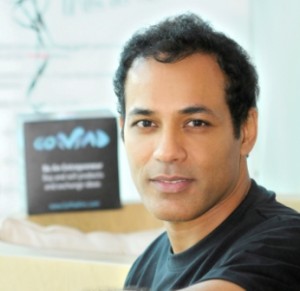Social media has revolutionised how enterprises operate and how people live their lives. So far the most influential players have originated from the States, but a new site coming straight out of the Middle East is convinced it will be bigger than Facebook.
If success was just determined by ambition, there’s no doubt that GoMadInc.com will be a household name in a few years time. Shabbir Adamji, founder and CEO of the new social website based out of Dubai, believes GoMad will attract more users than Facebook, which is currently closing in on the one billion mark.
GoMad marks itself as different from today’s most successful social networks – Facebook, Twitter, Google+ and LinkedIn – by almost taking aspects from them all.
Users divide their profile into ‘Social’ and ‘Professional’, and can allow their ‘Connections’ access to either or both. Perhaps its most unique features, however, are its ideas portal and eBay-esque selling portal.
“Everyone is always coming up with ideas, but these ideas usually die by the time they reach the office. We have developed portals for different categories. If you have an idea you post it there and if someone wants to buy it from you or develop it further they can do that,” Adamji says.
Users can purchase credits, which they can then use to buy products that users post. GoMad slates itself not only as a new platform for companies to sell on, but also an opportunity for individuals who want to turn to business.
“Our main focus is on individuals who can be entrepreneurs on this platform. New companies can sell their products and services on the site as well, but it’s more about going back hundreds of years when in a village you had a real person being an entrepreneur to service the needs of the village. It was easy for them to sell because everyone knew them in that village,” Adamji says.
“We are recreating that on the internet using social media and that reach is not a village now but the whole planet. So you are now running your business all across the globe using people you know to help sell your products and services. Once you post something all of your connections can see it and they can build on it. It’s like a snowballing effect – it gets bigger and bigger,” he adds.
Whilst there is an emphasis on individual entrepreneurship, GoMad also bills itself as a place where enterprises can generate new business, and predicts 30-40% of its user base will be organisations.
“We have a programme where people can endorse an organisation or company, and once you like it you become connected to it. So any new product that comes from that company you will know about. This helps companies sell products faster by getting users to endorse their organisation. The ROI will be linked to the direct sales of these companies because these people will help them sell and raise brand awareness,” Adamji says.
“We definitely expect to attract larger enterprises. Ultimately it’s up to businesses to determine what will work best for them on the website. The unique thing about GoMad is that businesses can target different audiences from one platform, so you’ve got a much bigger and more dynamic audience than most social media platforms,” he adds.
Making a difference
The final piece of the puzzle for GoMad is its charitable intent. Its name stands for ‘go make a difference’, and a tie-up with the United Nationals World Food Programme and Red Crescent allows users to donate direct from the site.
“The concept I thought of is what can I offer to the world that is as cheap as one dollar but can add value back? I asked myself the question, why are we not using the internet as it should be used? So people can donate their credits and earnings to this programme and it has a ticker so every time you donate you can see how you are making an impact,” Adamji says.
GoMad has forecasted to attract 500,000 users by December and 10 million after 12 months, with plans to expand in the U.S. in two years. Eventually, however, it is setting its sights on the ultimate goal – eclipsing Facebook.
“There is a global population of seven billion, but out of that only two billion are on the internet. So when we started this concept, we noticed there are five billion people that are not on the internet because they cannot afford it – we are giving them an incentive to use it. Other social media websites are targeting much smaller markets,” Adamji says.
“Of these two billion people [that do use the internet], are they really benefitting from the internet as much as they should? That’s the question to ask. Thinking of that, we’ve developed a product where people can spend time on the internet and benefit from it in some way, but also benefit the community around them. We are using people’s connections to grow their businesses or grow themselves. If you want to sell a product it is the people that you know that would buy from you first or recommend you to someone else,” he adds.
Whilst some people may question the tactic of targeting people that don’t use the internet, there is no doubting the company’s ambition.
“There’s no harm in having big goals. If you believe in your product you will do it one day. I’ve been a person that has been exposed to many different types of business environments. I’ve worked as a marine engineer working on ships, for a R&D company in India and in the construction industry in Dubai, so I’ve had experiences in many different fields. I’ve always had a focus on ideas and innovation,” Adamji concludes.






